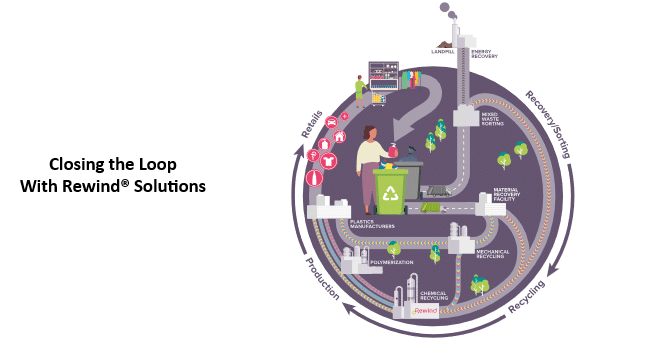Chemical Recycling: Axens Accompany you from Concept to Reality
Written By: Ms. Anabel Paco
The rising demand for plastics presents two main challenges: the environmental impact of production and waste, and the reliance on fossil resources. Enhancing plastic waste management through reducing, reusing, and recycling is crucial. Recycling plastics reduces the need for fossil resources and maximizes waste utilization. Most recycled plastics come from mechanical recycling, which has limitations like requiring homogeneous waste and not removing additives, leading to material degradation. Axens and IFPEN have been developing advanced recycling processes to eliminate additives and impurities, achieving quality comparable to virgin materials. Several of those technologies are now available and leveraged in the planning and development of chemical recycling projects.
Plastic industry and most notably petrochemical companies, when considering implementation of a chemical recycling unit in their plant are confronted with a several options that need sorting and clarifying (integration into existing plant, capacity, staged investment, feedstock sourcing, integration of the waste feedstock preparation unit, balance between feedstock preparation and severity of operation, etc…). At this crucial stage, decisions made on shallow bases and guesswork can lead to delays and cost overruns during the project execution and operation. Axens, through its consulting department ‘Axens Horizon’ is proposing upfront studies that bring a global and coherent approach to the evaluation process of a plastics chemical recycling project.
For example, Axens consulting group has recently conducted a comprehensive feasibility study for a refinery in Western Europe. The refinery aimed to identify the optimal processing configuration to chemically recycle post-consumer plastic waste using their existing infrastructure. Additionally, the refinery sought to partially replace fossil feedstock and reduce its overall CO2 footprint. That study enabled, just in a few weeks, to establish a complete screening of the options and through a financial analysis of the different cases definition of a robust pathway for getting the refinery to play a role in the plastics circular economy.
Study has been articulated in two main phases; initial screening of options followed by development of selected configuration. During the screening phase eight different processing configurations were compared to determine the most efficient and effective approach. This included, but not limited to:
- Construction of grassroots pyrolysis plant, leveraging Axens expertise in that field being the co licensor with Plastic Energy of the proven and robust Plastic Energy TAC Process technology.
- Processing of the pyrolysis oil in existing refinery assets in order to produce petrochemical feedstock or intermediate. Evaluating co-processing in various units, such as FCC, involved assessing the impacts on existing units, including feedstock composition and impurities. Additionally, the evaluation included product yield assessment and process scheme optimization.
- Revamp of an existing hydrotreatment unit into a dedicated purification unit (leveraging Axens Rewind® Mix technology expertise)

The initial technical economic ranking of the different solutions enables clients to select the configuration that then have been further developed:
- Technical Development: This phase involved detailed technical assessment, including material balance, utilities, and offsite requirements.
- Economic Development: Economic aspects were addressed, including CAPEX (Capital Expenditure) and OPEX (Operational Expenditure).
- Financial and Sensitivity Analysis: A thorough financial analysis was conducted, along with sensitivity analysis to understand the economic viability under different scenarios. Crucial variables impacting potential profitability were identified.
- Environmental Impact: was evaluated considering preliminary Life Cycle Assessment for each pathway in order to quantify potential CO2 reduction.
In some others studies for petrochemical and refinery companies, the study scope was further enlarged to include screening the different options to produce plastics intermediate from renewable feedstock. Economics as well as preliminary life cycle analysis were used in the process to rank the different bio and circular pathways for the site studied. Especially in Asia, end of life tires Pyrolysis Oil is also being evaluated by our clients as a potential feedstock to integrate in their circular strategy. In this case, several integration options are being evaluated supported by pilot testing in Axens’ facilities. Each of the cases are, of course, highly subject to the evolution of the legislation frame that for several elements is still under definition. Working with site owner, Axens experts are ensuring that the potential investments are robust enough with regards to possible changes in legislation implementation. For example, from the Asia regional perspective, we closely monitor domestic regulations as well as the European PPWR regulation, which will have a significant impact on the future circular roadmap in the region. In the latest approved text, the EU has opened the door to the import of recycled packaging from third countries, provided if they comply with EU regulations and adhere to EU standards to ensure high-quality recycling.
In each of the study cases, Axens Horizon delivered to customers’ stakeholders a long-term planning document that guides the future growth and development of the customers’ site.
About the Author:

Ms. Anabel Paco
Plastic Recycling Business Development Manager, Axens
Email: Ana-Isabel.PACO@axens.net
Anabel is in charge of powering plastic circularity through advanced recycling technologies on Asia Pacific, she is based in Kuala Lumpur. She started her professional career on field 13 years ago at Repsol. In 2014 she joined Axens where she occupied different positions in Technology and Sales. Anabel holds an Engineering Degree from the Universidad Politécnica de Valencia (UPV), Spain, a Msc in Oil Refining, Petrochemicals and Gas from Repsol Higher Training Center (CSFR), Spain and a MsC Engineering in Energy Systems and Thermal Processes from Cranfield University, UK.